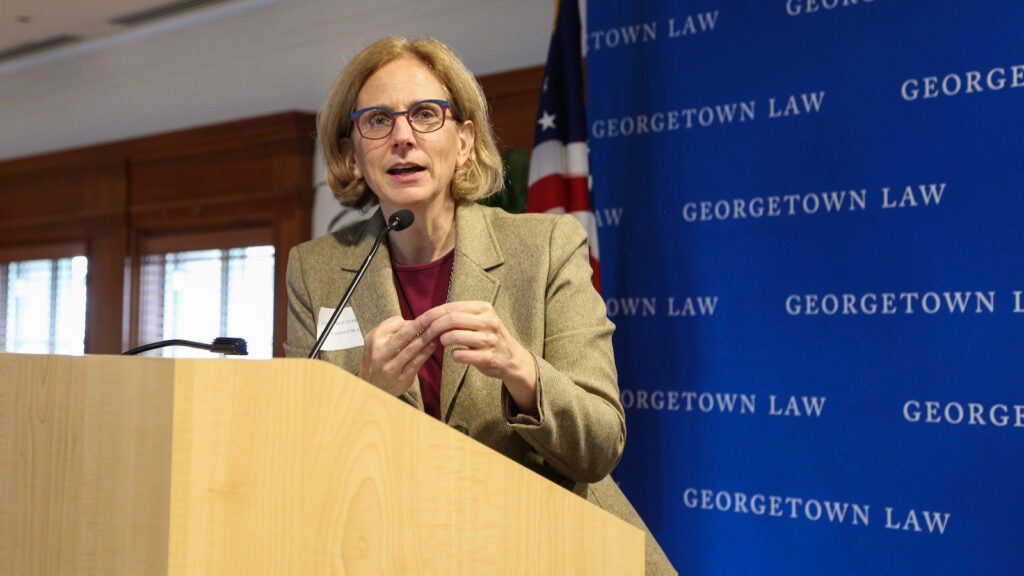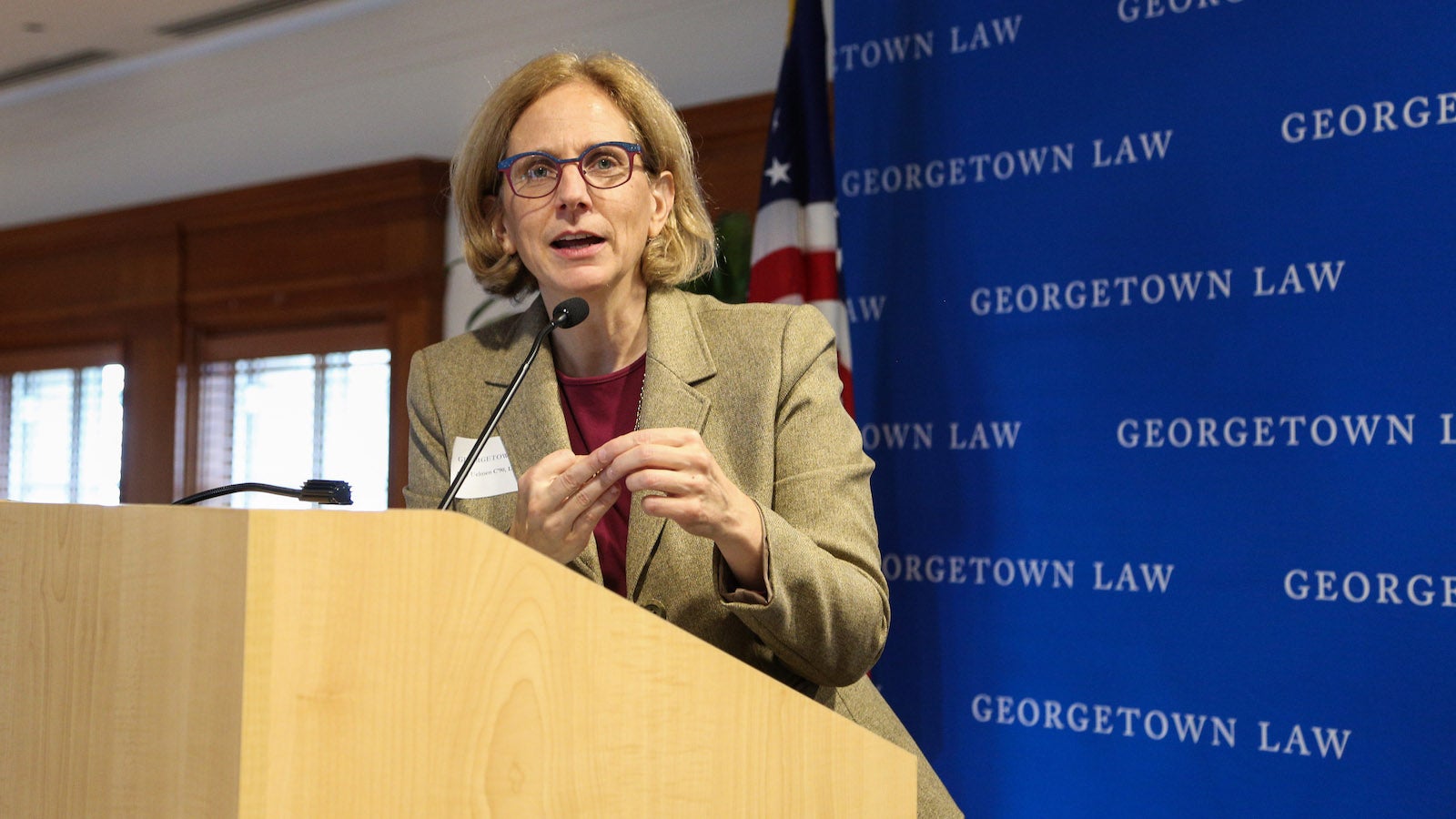Women in Faith: Dr. Amelia “Amy” Uelmen (C’90, L’93, L’16)
How the Director of Mission and Ministry is helping law students find their footing in a polarized world.
By Jennon Bell Hoffman

Dr. Amy Uelmen (C’90, L’93, L’16) speaking at a luncheon for alumni and students interested in sustaining conversations about religious values and the practice of law. (photo courtesy of Amy Uelmen)
Dr. Amelia “Amy” Uelmen (C’90, L’93, L’16), has a unique designation: a Triple Hoya. First joining the Hilltop as an undergrad, she then earned her law degrees at Georgetown, and years later, returned as a lecturer and since 2021, has been the Director for Mission and Ministry at the Law Center. This distinction allows for a wide breadth of experience to pull from when it comes to education, ministry, and helping shape the law student experience. As part of our Women in Faith series, we asked Dr. Uelmen a few questions about her approach to current student issues, how Jesuit principles play a part in forming future lawyers, and how only tacos can make everyone happy.
Campus Ministry: Being a Triple Hoya, how have you seen the university change from when you were a student to now as a director? What remains the same?
Dr. Amy Uelmen: In terms of ministry, I think there is an increased appreciation for what lay people have to bring. Especially in a professional school setting, mission collaboration is greatly aided by the skills and insights and the on-the-ground work that often belongs with lay expertise and experience. I came into the director role right after the pandemic, and the community was really hurting due to the profound disruptions, grief and tensions. So I came into this leadership role when we knew we would need to place a heavy emphasis on relationships as the starting point, and really, almost the whole point. Circumstances were also pointing us in the direction of needing to be very concrete and close to the ground in our efforts to understand what people need, and then to embrace this breadth of human experience in order to come back together as a community.
CM: Broadly speaking, it doesn’t feel like faith and law would naturally intersect often, as one feels more heart-centric, and the latter feels more head-centric. How do you see faith working with law and how that shapes how to educate future law practitioners?
AU: The connection that I’ve been working on for quite a number of years now is less in the area of “law and faith”, and more in the work of “lawyers and faith.” We want to equip students, and already-practicing lawyers, to be able to bring their full selves into their work, and into their professional lives, and for some that includes their faith perspective. The project is trying to understand how to draw on the resources of one’s faith, but also be self-aware in reflecting on the questions that this raises, without making assumptions about how it will be received. At times some might have a kind of romanticized notion of what it means to bring your faith perspective into your work as a lawyer. But from what I have seen, it’s a tough world and I think for many people, their faith, resources, and convictions and ways of looking at the world can serve as a very helpful resource for staying fully human and engaged when it’s otherwise difficult to do so. That’s the connection I’m working on.
CM: Do you find you have a lot of heavy lifting to do to get students to see themselves differently, to not compartmentalize their identities?
AU: I have occasionally heard critiques in the professional school world, that this work is not helpful or necessary. Some might say “Students at this stage in their education are already fully formed, they know what their identity is, so we don’t really need to work on this.” And my response to that is: they may have some sense of their religious identity, but most don’t yet understand how to integrate their personal values and convictions with their new profession. For that dimension, they are still learning. Further, even for those ready to draw these dimensions together, there are still further questions about what this work looks like in an intensely polarized climate. It’s a lot to think about for students, and for anyone, really.
CM: Since each student is bringing their personal values, convictions, and experiences to their law education, where do you find your starting point?
AM: I team teach a seminar called “Religion, Morality, and Contested Claims for Justice,” which is exactly about learning communication skills for talking about deep religious or personal convictions and values in a variety of settings, and bringing these dimensions into conversation on otherwise polarizing political topics. A good starting point for this work is to help them realize that it’s logical that they will make mistakes and missteps in the process of learning how to communicate well. We need to invite them onto the journey of learning, and that includes giving themselves – and others – some grace and some slack when people make mistakes.
CM: Do you think it feels more urgent now—post-pandemic, during a charged political and social climate—for students to decide how they want to integrate their political values with their education and with their faith?
AU: For me, the beauty of being at a Jesuit institution is the emphasis on building in a capacity to reflect. In my experience, this also means helping everyone slow down—slow down in their reactions, slow down for the time it takes to sort through the complexity of some of the challenges that we’re dealing with, and especially important, slow down in order to fully appreciate how deep the differences might be. As educators, one of the greatest gifts that we can give our students – and our colleagues – is to impart the importance of taking the time that we need to be thoughtful in our interactions and how we process ideas and conflicts, taking the time that we need to truly listen. This can go a long way in avoiding the pitfalls of immediately mapping one’s own assumptions onto others.
CM: As Director for Mission and Ministry at the Law Center, what do you hear from alumni—recent or otherwise—about Jesuit principles or how faith and practicing law intersect?
AU: Toward the end of the interdisciplinary seminar that I teach, we have a class session where the alumni of the seminar come back for a “World Cafe” rotating small group discussion exercise with the students. It’s kind of a moment of truth to discuss the realities that they have encountered in trying to apply the communication principles and practices. It’s really lovely to see how the lessons and frameworks filter through into a variety of settings. For example, one student who is both a lawyer and a journalist shared how helpful the principles of the class have been in his contributions to union negotiations.
They share stories about how stepping into another person’s perspective, or to slow the conversation down enough to ask the other person what’s at stake for them, has made a difference in their work and helped them to be more successful as lawyers, as well. Some also share how they have applied the communication principles in their personal lives to good effect.
CM: Who are some of the women in your life, personal or professional, that have shaped who you are?
AM: First, my mom. She went to law school when I was in high school, and my dad was a law professor. I remember the scene at the dinner table when my dad would inject some of his professional habits such as his work with students to teach the skill of cross examination. She would look him straight in the eye and say: “Don’t you play district attorney with me!” What I admired – and continue to admire – in my mom is her capacity for clear communication, and when necessary, also setting clear boundaries. From her I learned that asking for respect from others is a deep form of love. This has also helped me to understand my own limits and set healthy boundaries. I have a sign on my file cabinet in the office that reads: I can’t make everybody happy. I’m not a taco.
I also take inspiration from Disney’s Moana. A few years ago, I led a reflection for law students entitled: Disney’s Moana, a Hero for Our Times. I love the film’s emphasis on locating your interior voice as a guide for understanding your mission in the world, and she lets her mission come to her – she does not try to control it. I also appreciate how she always kept her eye on the most vulnerable – whether the struggling baby turtle in the opening scene, or throughout the film, her sidekick, the cognitively impaired rooster. She’s hugely countercultural and a bit of a mystic.
Finally, my grandmother, Trudy, was also a huge influence in my life. I love how she used food and play in order to bring our family, and many others, together. She made each person feel like they’re the most special person in the universe. That informs a lot of my approach to ministry too.
I’ve also had wonderful mentors in each step of my education and my professional career, and I owe a lot to each of them.
CM: In what ways do you use your own experiences and knowledge to help law students navigate the transition from student to law professional?
AM: I like to make lots of space in my calendar for mentoring, both law students and also the younger women staff. I keep saying, if you want to see what somebody cares about, look at their calendar. So for those with whom I have a mentoring relationship, I try to make time to meet at least monthly, often for lunch or breakfast. I try to be a sounding board for them, as they’re developing their own professional profile. Sometimes the waters are rough, so it can be very meaningful to know that someone is listening and truly cares.
Jennon Bell Hoffmann is a freelance writer and editor living in Chicago.
- Tagged
- Law
- Women In Faith
